New Solar Projects Drive Egypt’s Renewable Energy Strategy
Egypt is making significant strides in its renewable energy sector, with the latest egypt solar news highlighting the advancement of several key projects. The Ministry of Electricity and Renewable Energy, led by Dr. Mohamed Shaker, has prioritized funding for these initiatives, focusing on power plants in Aswan and the Gulf of Suez. These projects are a key component of Egypt’s Vision 2030, a plan to increase the country’s renewable energy capacity and reduce its reliance on fossil fuels.
A cornerstone of this effort is the Benban Solar Park, already operational with a capacity of 1.8 gigawatts (GW) and set to expand through additional phases. The government is also developing solar projects in Zaafarana and Kom Ombo, each with a capacity of 500 megawatts (MW). By the end of 2023, Egypt’s solar capacity included 1.5 GW at Benban, 26 MW at Kom Ombo near Aswan, and 50 MW at the Zafarana project on the Red Sea coast.
These initiatives are part of a broader strategy to diversify Egypt’s energy mix and reduce its carbon footprint. The government has set an ambitious renewable energy target to generate 42% of the country’s electricity from renewable sources by 2035, with solar energy poised to play a significant role in achieving this goal.
Government Support and International Collaboration Drive Solar Growth
The Egyptian government has been proactive in attracting investment for its solar projects, with the Ministry of Electricity working closely with international financial institutions to secure funding. For instance, the European Bank for Reconstruction and Development (EBRD) has been a key partner, providing financial support for several of these initiatives.
Beyond direct financial support, the government has implemented policies to encourage private sector investment. The feed-in tariff program, which offers long-term contracts to renewable energy producers at fixed rates, has been instrumental in attracting investors. In parallel, the New and Renewable Energy Authority (NREA) collaborates with the National Project Grid-Connected Small-Scale Photovoltaic Systems (Egypt-PV) to promote small-scale solar projects (<500 kW) and support the wider solar PV market, as detailed in this Egypt Solar Panel Manufacturing | Market Insights Report.
The Ministry of Electricity is also working to improve the country’s transmission infrastructure to accommodate the growing share of renewables. Upgrades to the national grid are underway to integrate more solar and wind power into the system, a crucial step in ensuring that increased capacity from solar projects can be efficiently distributed nationwide.
Challenges and Future Prospects for Egypt’s Solar Energy
Despite the progress, challenges remain. The intermittent nature of solar power requires advanced grid management and energy storage solutions. To address this, the Egyptian Electricity Holding Company (EEHC) has initiated a tender for an 8.2 MW solar plant and a 2 MW/4MWh battery storage system in Siwa Oasis, western Egypt. The Ministry of Electricity is also exploring options for other battery storage systems and technologies to help manage intermittency.
Another government focus is localizing the production of solar panels and other components to reduce project costs and create jobs in the renewable energy sector. To boost these local capabilities, ARECO has signed a solar panel manufacturing plant contract. In parallel, the Ministry of Trade and Industry is working with manufacturers to develop the necessary infrastructure and expertise.
Egypt’s solar energy sector is poised for significant growth, as the country’s abundant sunshine and vast desert areas provide ideal conditions for large-scale projects. The Ministry of Electricity is also exploring opportunities to export solar power to neighboring countries, which could further accelerate the sector’s expansion.
Egypt’s commitment to renewable energy is evident in its ambitious solar projects and supportive policies. The Ministry of Electricity’s focus on securing funding and improving infrastructure is paving the way for a sustainable energy future. As Egypt continues to invest in solar power, it is on track to become a regional leader in renewables, contributing to global efforts to combat climate change.



